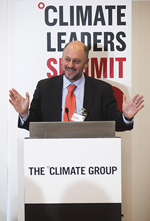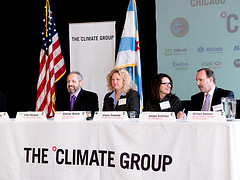Two of the major peak business organisations in the US have actively lobbied against government action on climate change. The National Association of Manufacturers (NAM) has claimed that regulating carbon emissions "will inevitably cripple the economy" and the US Chamber of Commerce is challenging Environmental Protection Agency (EPA) efforts to regulate emissions in court.
Corporate Sponsorship of the Climate Change Talks in Poland in 2013
Specialist lobby groups in attendance at the UN climate conference in Cophenhagen in 2009 included:
| Copenhagen Clim. Counc. Combat Climate Change The Climate Group Australian Lobbyists |
Source: 'ICIJ at COP15: Meet the BINGOs', The Center for Public Integrity, 17 December 2009. |
 Copenhagen Climate Council was founded by the Scandinavian think tank, Monday Morning. It seeks "to promote constructive dialogue between government and business". It is chaired by Australian scientist Tim Flannery (pictured) and has 30 councillors who are "global leaders, active in business, science, and public policy". They include the CEOs of Duke Energy ("one of the largest power companies in the United States"), Dong Energy (a Danish energy company), China Electric Power International, PricewaterhouseCoopers International and the Virgin Group, the President of the World Business Council for Sustainable Development, the Vice Chairman, Climate Change Capital "a leading investment banking group", the Global Head of Environmental Markets, Goldman Sachs.
Copenhagen Climate Council was founded by the Scandinavian think tank, Monday Morning. It seeks "to promote constructive dialogue between government and business". It is chaired by Australian scientist Tim Flannery (pictured) and has 30 councillors who are "global leaders, active in business, science, and public policy". They include the CEOs of Duke Energy ("one of the largest power companies in the United States"), Dong Energy (a Danish energy company), China Electric Power International, PricewaterhouseCoopers International and the Virgin Group, the President of the World Business Council for Sustainable Development, the Vice Chairman, Climate Change Capital "a leading investment banking group", the Global Head of Environmental Markets, Goldman Sachs.
The Council lobbied for a goal of 450ppm greenhouse gases by 2050; a global emissions trading market including carbon credits for avoiding deforestation (that is allowing polluters to offset their own emissions by paying for forests not to be logged); more financial support for research and development of new technologies, energy efficiency, carbon sequestration in soils, and sustainable agriculture.
Combat Climate Change (3C) is a coalition of 66 "of the world’s largest corporations" including General Electric, Bayer, Unilever, Dow Chemical, Citigroup, BP, Duke Energy, Dong Energy, E.ON, Volvo, and Veolia. It was established in 2007 by Swedish energy giant Vattenfall, which also provides its secretariat. It has had "an active and constructive dialogue with global policy makers across the world".
3C lobbied for a global emissions trading market and government support for emerging technologies such as 'carbon capture and storage, offshore wind, solar photovoltaic and second-generation biofuels'.
 The Climate Group combines governments — including Greater London Authority, the Government of Scotland, various Canadian provincial governments, various Australian state governments — and business members — including Barclay's Bank, BP, Coca-Cola, Climate Change Capital, Duke Energy, IBM, JP Morgan Chase, News Corporation, Nike, PepsiCo, Tesco and Virgin.
The Climate Group combines governments — including Greater London Authority, the Government of Scotland, various Canadian provincial governments, various Australian state governments — and business members — including Barclay's Bank, BP, Coca-Cola, Climate Change Capital, Duke Energy, IBM, JP Morgan Chase, News Corporation, Nike, PepsiCo, Tesco and Virgin.
The Group promotes technological solutions to global change rather than regulatory solutions and in particular, energy efficiency and reduced deforestation now and investment in "carbon capture and storage (CCS), large scale solar and new generation nuclear, along with public infrastructure such as smart grids" for the future.
A list of greenhouse gas emitting companies and peak industry bodies and the firms they employ to lobby government, provided by the Sydney Morning Herald in 2009, can be downloaded here ![]() . The main industry lobby group is the Australian Industry Greenhouse Network (AIGN).
. The main industry lobby group is the Australian Industry Greenhouse Network (AIGN).
Australia is the only nation that includes industry representatives as part of its official negotiating team at international climate conferences. Even the US leaves its industry representatives in the gallery to observe. As well as industry interests within the Australian delegation, industry is also represented at the talks by paid lobbyists who monitor proceedings and influence the Australian government stance, such as Hannagan and Bushnell on behalf of the Australian Aluminium Council (AAC).
In fact, Guy Pearse suggests in his book climate policy in the Howard government era, that industry personnel, who had previously worked in government departments, "were in fact still writing government policy despite now working for industry — and in doing so, contaminating the independent process of government. He quotes one senior industry person:
I have sat inside treasury and helped to draft cabinet submissions in that period ... I have sat inside the industry department writing briefs ... helping write briefs on certain issues for the minister ...